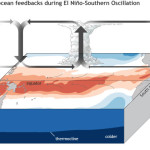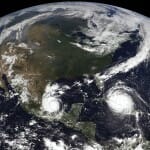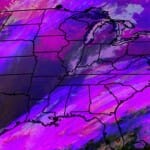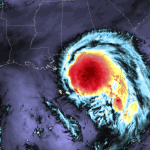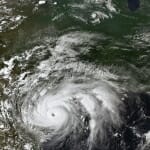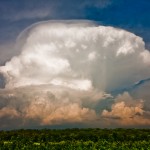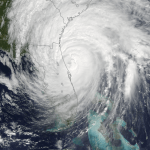Tag National Oceanic and Atmospheric Administration
Northern lights put on show above Lake Mendota
Members of the University of Wisconsin–Madison community who stayed up late Sunday evening were treated to a dazzling light show as the aurora borealis — or northern lights — danced across the night sky in hues of green and pink.
Earth’s orbit is more important in driving tropical Pacific climate than previously thought
Researchers found that the atmosphere and ocean pushing on each other is important in creating the climate on the tropical Pacific.
UW hurricane application gets upgrade in time for 2022 hurricane season
Forecasters at the National Oceanic and Atmospheric Administration’s National Hurricane Center will have access to the most advanced storm measurement software yet to help them save lives and property with timely warnings.
Ocean life helps produce clouds, but existing clouds keep new ones at bay
New research findings from the UW, NOAA and others may change the way scientists predict how cloud formation responds to changes in the oceans.
Trends in hurricane behavior show stronger, slower and farther-reaching storms
Global trends suggest hurricanes are getting stronger, moving more slowly over land, and deviating farther north and south of the equator. With these changes come stronger winds, increased flooding, and risks posed to cities that historically have not been hit by these types of storms.
40 years and counting, NOAA renews partnership with UW
CIMSS is recognized internationally for its satellite expertise, spanning geostationary and polar-orbiting platforms. This network of satellites forms the backbone of a global observing system developed to monitor our planet and ensure public safety.
Long-term data show hurricanes are getting stronger
In almost every region of the world where hurricanes form, their maximum sustained winds are getting stronger. A warming planet may be fueling the increase.
NOAA listening session to focus on weather research, forecasting improvements
“It’s an honor to have NOAA leadership visiting campus,” says Associate Vice Chancellor Steve Ackerman. “It acknowledges our history and expertise in this area of science and recognizes that we have important contributions to make."
Can plants and trees change the weather?
An array of towers, aircraft and researchers will keep watch over the Chequamegon-Nicolet National Forest in northern Wisconsin, focusing on an area from a region of the country sensitive to changes in climate.
Climate experts available to media
The following University of Wisconsin–Madison experts are available to speak with reporters regarding the Paris Climate Agreement and the impact of potential changes. President Trump is scheduled to make an announcement regarding the pact at 2 p.m. Central time today.
More frequent hurricanes not necessarily stronger on Atlantic coast
Active Atlantic hurricane periods, like the one we are in now, are not necessarily a harbinger of more, rapidly intensifying hurricanes along the U.S. coast, according to new research performed at the University of Wisconsin–Madison.


